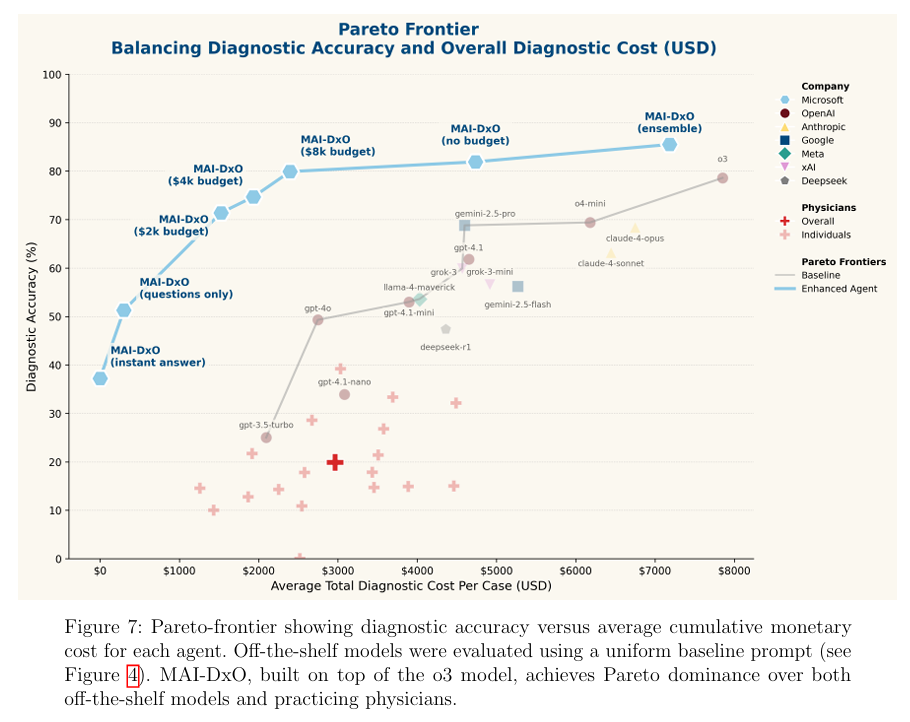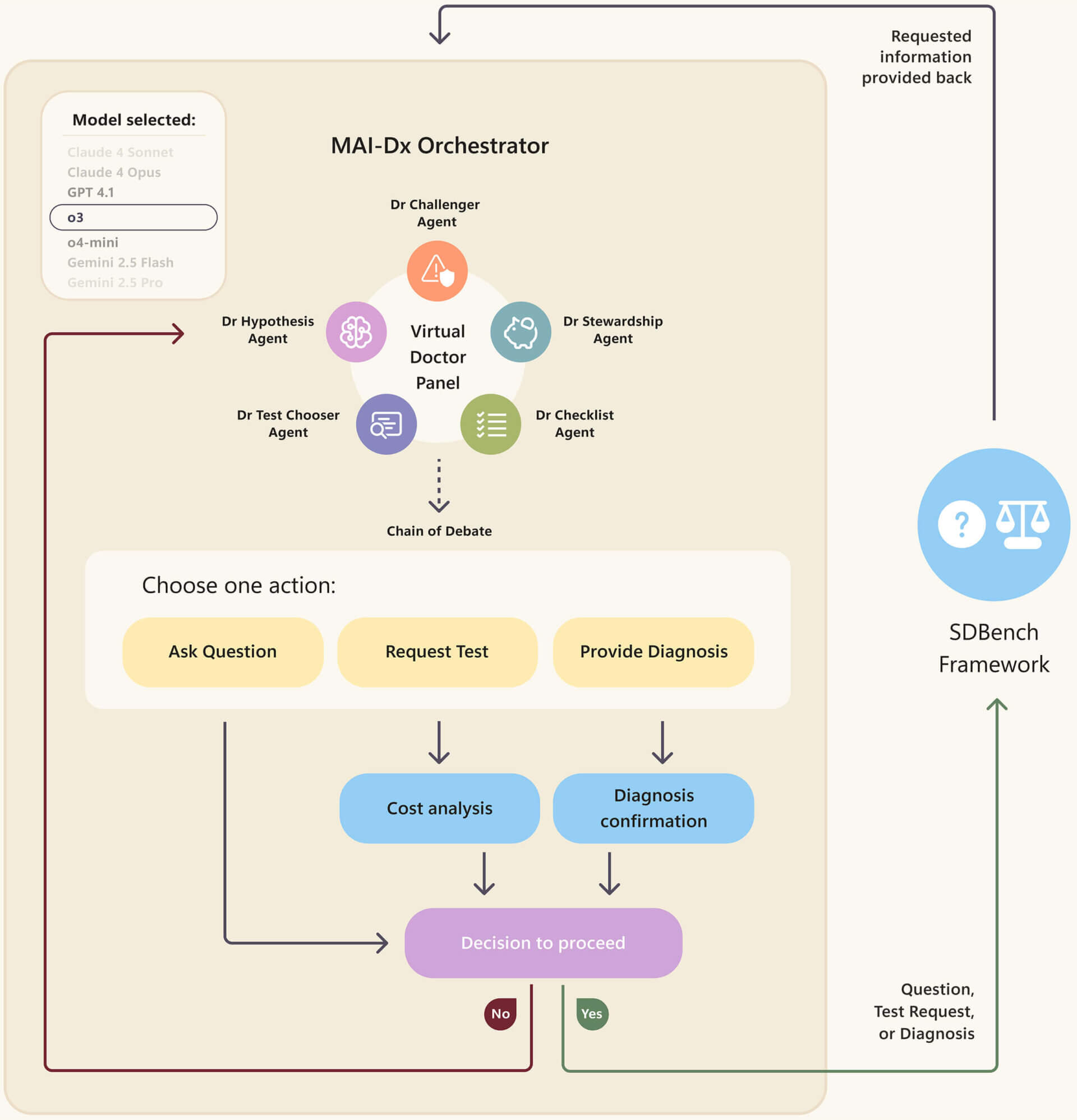萨提亚·纳德拉希望人工智能成为你的下一个医生。
微软首席执行官本周在社交媒体上宣布了两项医疗保健人工智能的进展,包括MAI-DxO,这是一个模拟多个虚拟医生共同解决医疗难题的系统。
在对304个复杂病例进行测试时,微软报告称,人工智能正确诊断了85.5%的病例。而一组21名经验丰富的医生在处理相同病例时,仅正确诊断了20%。
“很高兴分享两项进展,使我们在医疗保健人工智能领域更接近实际影响,”纳德拉写道。“MAI-DxO是一个模型无关的协调者,模拟一组虚拟医生。它的诊断准确率为85.5%——是经验丰富医生的四倍,同时降低了诊断成本。”
这一公告正值微软加入众多科技公司竞相将人工智能应用于医疗保健最棘手问题的行列。
根据约翰霍普金斯大学的数据显示,美国每年在医疗保健上的支出接近$5万亿——而诊断错误每年影响1200万人,利用人工智能解决与人类相关的问题似乎是一个显而易见的选择。
微软的医疗委员会如何运作
MAI-DxO就像一个被困在计算机中的医疗梦之队。该系统通过微软称之为顺序诊断基准(SDBench)的方法来处理病例。
与传统医疗人工智能测试中的多项选择题不同,它模拟了医生的实际工作方式:从有限的信息开始,询问后续问题,安排测试,并在新数据到达时调整理论。
每个测试都会产生虚拟货币的成本,迫使人工智能在全面性和医疗支出之间进行平衡。
换句话说,它基本上模拟了一个医疗委员会在辩论一个病例,不同的模型扮演不同的角色。模型之间进行辩论、意见不合,最终达成共识,就像你的医生在处理一个复杂病例时所做的那样。
在一种配置下,MAI-DxO在每个病例花费2397美元时达到了80%的准确率,约比医生通常花费的2963美元少20%。
在最佳表现时,它以7184美元的成本达到了85.5%的准确率。相比之下,OpenAI的独立o3模型达到了78.6%的准确率,但成本为7850美元。

图片:微软
虚拟医生小组包括假设医生(Dr. Hypothesis),他使用贝叶斯概率方法维护三种最可能诊断的实时列表。
测试选择医生(Dr. Test-Chooser)每轮选择最多三项诊断测试,旨在获得最大的信息增益。
挑战医生(Dr. Challenger)充当反对者,寻找与主流理论相矛盾的证据。管理医生(Dr. Stewardship)否决低诊断价值的昂贵测试。
与此同时,检查清单医生(Dr. Checklist)确保所有测试名称有效,并保持团队的推理一致。

图片:微软
微软在2024年至2025年间对《新英格兰医学杂志》上发表的病例进行了系统测试,这些病例是在人工智能训练截止日期之后发布的,消除了模型记忆答案的可能性。
这些研究是需要彻底检查才能正确诊断的困难病例。
微软招募的21名医生的经验在5到20年之间,中位数为12年。
他们在没有同事、教科书或人工智能协助的情况下工作,以确保原始诊断能力的公平比较。他们在这些公认的困难病例中报告了20%的成功率。
该系统以几种模式运行。“即时回答”仅根据初始信息提供诊断,费用为300美元——相当于一次医生就诊的费用。
“仅提问”允许进行后续提问而不进行测试。“预算”模式跟踪成本,并设定最大支出限制。“无预算”则让小组自由发挥,而“集成”则运行多个小组并汇总他们的结论以实现最大准确性。
医学的未来?
MAI-DxO代表了微软在消费健康人工智能领域的更广泛推动。
该公司报告称,其Bing和Copilot产品每天有超过5000万次与健康相关的会话。从膝盖疼痛搜索到急救查询,微软认为搜索引擎和人工智能助手将成为医疗保健的新前门。
当然,这只是医疗技术漫长时间线上的又一步。
作为背景,斯坦福大学的MYCIN系统在1970年代诊断细菌感染,而谷歌的AMIE在去年模拟了医生与患者的对话。
微软开发MAI-DxO作为一个模型无关的系统,这意味着它可以与来自不同公司的人工智能模型协同工作。
在测试中,它使来自OpenAI、谷歌、Anthropic、Meta等公司的模型的性能平均提高了11%。这一改善在所有测试模型中都是统计显著的。
领导微软人工智能研究的多米尼克·金博士和哈沙·诺里在一篇博客文章中强调,这项技术仍然是一个研究示范。
“在生成性人工智能能够安全、负责任地在医疗保健中部署之前,仍然存在重要挑战,”他们写道。该系统在复杂的诊断挑战中表现出色,但需要在常规病例上进行测试。
微软计划将研究提交同行评审,并与医疗保健组织合作,在临床环境中验证该方法。
该公司明确表示,任何部署都需要“严格的安全测试、临床验证和监管审查”。
目前,MAI-DxO仍局限于研究实验室。但由于诊断错误导致近10%的患者死亡,并每年影响数百万患者,微软的虚拟医生小组代表了朝着人工智能辅助医疗保健迈出的又一步。
这支五名医生的人工智能团队可能比21名人类医生的综合诊断更好,但现在仍为时尚早,无法看到主流实施。
微软表示,人工智能不会取代医生;它将增强医生的能力。那21名在这些艰难的NEJM病例中得分20%的医生可能希望这是真的。
免责声明:本文章仅代表作者个人观点,不代表本平台的立场和观点。本文章仅供信息分享,不构成对任何人的任何投资建议。用户与作者之间的任何争议,与本平台无关。如网页中刊载的文章或图片涉及侵权,请提供相关的权利证明和身份证明发送邮件到support@aicoin.com,本平台相关工作人员将会进行核查。




